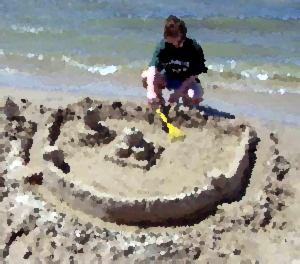|

Castles
By James Maloney
He had his tools, the lad. A yellow bucket moulded as a castle, a short
handled spade the colour of orange jelly. All around him, other children
were packing wet sand into their buckets and building castles. He ran
into the crowd of children, found a spot in the middle and started to
build. He had a routine — he filled the bucket, sliced the extra
sand off the top, hammered it with the flat of his spade then turned
it upside down and eased it out.
His sister joined him for a few minutes with her own bucket, then set
it down and walked back to the cliffs. “I'm going to explore,”
she said. “Coming with me?”
He shook his head. There was work to be done. When he looked at some
of the other castles, he felt twisted sick with envy. He would not stop
until he had their measure.
He worked to the rhythm of the sea, treated it like a drum. One, two,
one, two. Sand to gather, castles to build.
“Tom?” He turned on hearing his sister’s voice —
it could have been the glare of the sun, but she seemed taller. She
was holding another boy's hand, a boy he didn’t know. Come on,
she shouted, come and explore. Have some fun. It's such a giant beach.
He shrugged, knelt and scooped another bucketful of damp sand. A tennis
ball rolled up to the edge of his castle. He heard shouting and saw
some young men playing cricket, beckoning him to join them. He hurled
the ball back, surprised at how far he threw it, then picked up his
bucket again.
He’d built the third layer when a woman called to him, and when
he turned he wondered how she knew his name — he was sure he didn’t
know her though the little girl at her side looked familiar. “Come
on, Tom, why not take a break?”
He was too busy to take breaks. The others had stopped building, but
he wanted something magnificent, something to show them all what a castle
should look like. A football thudded against him. He booted it away
and kept building.
Sure enough, a small crowd came to stand and watch. Older men with jumpers
tied round their waists, women with backpacks. They didn't say anything;
they watched him fill his bucket, scrape the top, pack it down and then
turn it to add a fourth level. His castle was easily best on the beach,
but still he wasn't finished.
As the sun started turning red, he dropped to his stiff knees and used
his spade to start digging a moat. The sand was getting heavy and he
was feeling tired, his back ached and his mouth was dry. He couldn't
remember doing anything else other than building the castle. It was
magnificent, truly.
The beach was full of people sitting on deckchairs, looking out to where
the sun dipped into the water, watching a boat chugging toward the shore.
A bonfire blazed from on top of the cliffs.
The tide washed at the edges of his castle, taking nibbles of sand as
it rolled back. He turned, hoping to see his sister sitting there, to
see how proud she would be, but his eyesight was blurry in the fading
light — he tried to call her and was shocked at the croak in his
voice. He realized he couldn’t remember her face.
The boat was nearing the shore. The old folk laboured to fold their
deckchairs and form a queue, lining up two by two, hand in hand. He
saw one of the old women and felt a tug in his chest, as if he knew
her, but she was lost in conversation with the man she was with.
He watched them boarding the boat, resting his tired arm on top of the
sloping castle, until there was only him there on the beach as the boat
chugged into the sunset and the sea started roaring around him.
|
